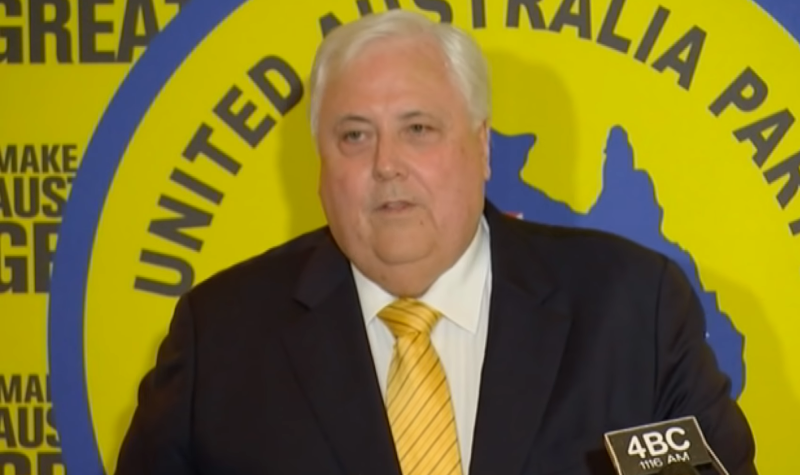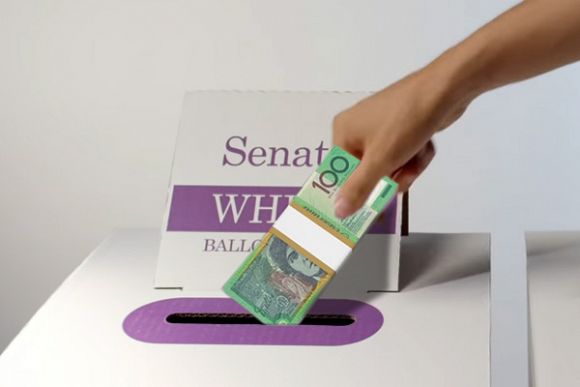Key reforms for fairer elections have been set out in the government interim report, but the devil is in the detail, writes Saffron Zomer.
AUSTRALIANS WANT to see an end to big money polluting our democracy. With this week’s arrival of the report titled'Conduct of the 2022 Federal Election and other matters', we can all celebrate a significant turning point.
The details of campaign finance reform can be dry and feel distant from the real problems we all deal with in daily life. But this stuff is actually fundamental to everything we care about, how we live our lives and the people we love. Whatever issue it is that keeps you up at night, whether it’s the climate crisis, public health, finding a place to live that you can afford, or simply the integrity of our political system, the impact of big money on our democracy is part of the problem.
That’s why this report from the Joint Standing Committee on Electoral Matters (JSCEM) which landed on Monday is actually exciting reading for anyone who cares about democracy, or wants to make progress on an important issue.
I’ve spent 15 years pushing open the shockingly heavy doors of Parliament House to advocate to our elected representatives in the public interest. Such a big part of being a public interest advocate in federal politics is pushing those heavy doors open for community voices to be heard in the "halls of power".
Harmful industries like fossil fuels, big alcohol and tobacco, weapons manufacturers and gambling walk through those same doors in Parliament with much greater ease; at least you have to assume this based on the fleets of them that walk the halls of Parliament every day. Big money has a way of greasing the hinges in an electoral system where the amount a party or candidate spends is overwhelmingly correlated with their chance of winning office.
This week, the JSCEM, published recommendations for reforms that could, if well executed, help those doors open for all of us, not just the wealthy and powerful few.
The JSCEM recommended caps on campaign donations and spending, a significantly lower the threshold for donations disclosure (from $15,200 to $1,000) and the introduction of real-time disclosure so that we know who is bankrolling our elections.
If (strong emphasis on if) these reforms are implemented properly, it would make our elections so much less vulnerable to being bought by vested interests. When we start to push big money out of our political system, we are making room for people and the public interest to get in.
That said, there are recommendations that pose significant risk: the wrong settings for donations and election spending caps could result in an even more unequal playing field, not the improvement we want.
This is why, as dry as campaign finance is, our civil society alliance #OurDemocracy has spent the past two years consulting stakeholders and endless hours working to get the details right, because fairer elections are the key to getting big dirty money out of our political system so that we can get people back into the heart of it, where we all belong.
To influence these recommendations, the JSCEM heard from civil society organisations that comprise #OurDemocracy through submissions and meetings with ministers and committee members. We facilitated the ability of ordinary Australians to have their voices heard, and JSCEM received 317 submissions from supporters of the #OurDemocracy campaign. For such a dry, complex area of reform, that’s really impressive and inspiring political engagement from the public.
Changemakers know these big moments never just happen. It's taken sterling work from the civil society sector over many years to get resounding recommendations to limit big money in our elections.
So this moment is definitely a big milestone on our journey to a healthier democracy where dollars don’t determine policy, people do. But to get there, we need the Government to commit to bring civil society leaders and stakeholders to the table, and work with us to get the details right.
The risk of getting it wrong is high: we could see a less open Parliament and a less vibrant civil society. The opportunity of getting right is exciting. It will bring a fairer and more open democracy, where our voices are more equal, and our representatives are more accountable to us, the people.
Powerful industries that use their money, power and influence to protect business models that harm our health and destroy our planet have held sway over our democracy for too long. It’s a big step to see a parliamentary committee recommend reforms that could start to reduce this influence so our democracy can work the way it’s supposed to.
The details matter, a lot. And the way to get them right is to have a genuine consultation with all the voices which participate in our public debates.
As civil society organisations whose only interest in this is a functional democratic system that we can all trust, we will work together to continue to push gently but persistently on the doors of Parliament to ensure that these doors remain open for all.
Saffron Zomer is a lawyer, strategist and Executive Director of the Australian Democracy Network.
The #OurDemocracy campaign was developed by three organisations, the Australian Conservation Foundation, the Human Rights Law Centre and the Australian Democracy Network, together with the input of over 30 more. These core organisations continue to develop policy solutions and campaign for reforms, but just as our democracy belongs to all Australians, the #OurDemocracy campaign belongs to a wide range of people and organisations passionate about making our democracy fairer for all. Join us.
 This work is licensed under a Creative Commons Attribution-NonCommercial-NoDerivs 3.0 Australia License
This work is licensed under a Creative Commons Attribution-NonCommercial-NoDerivs 3.0 Australia License
Support independent journalism Subscribe to IA.












